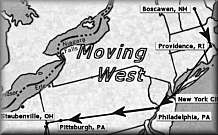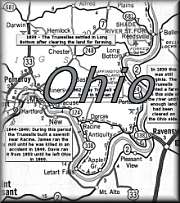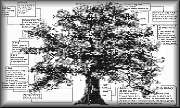Major Amos and Laura Trussell:
Westward Migration Begins
In June 1812, President Madison asked Congress to declare war on Britain. Amos apparently joined the war effort, as when he returned to New Hampshire, he was commonly referred to as "Major" Trussell. Most likely he left his two sons under the care of his older sister Elizabeth who lived with his parents. Amos probably participated in the American effort to overtake Canada, not a very successful military campaign, in large part because of the parochial character of the various Colonial militia.
 Laura Jewett Trussell |
Laura and Amos continued to live in Boscawen for some time, even as Laura’s relatives moved to the West [Ohio] and wrote back to NH about the wonders they saw there. Shortly before his father died in the middle of the winter of 1825/26, Amos purchased the family property from him. Even before that, Amos, Laura and their children were living with James, Abigail and their oldest daughter, Elizabeth [Aunt Betsy]. Aunt Betsy took care of her parents. But the hard living in New Hampshire, made the Jewett's letters describing the rich Ohio River bottom land sound mighty appealing, especially to a family with eight growing boys who could work the land. Harriet Trussell Fulton, Amos' second daughter writes the following about life in Boscawen:
|
"Our farm [in NH] was located about twelve miles northwest of Concord, the state capital. Our community was not a village, but the name of the township was Boscawen. As I remember, it seems to me we were on the south side of that road running east and west. We had a very comfortable home of six or seven rooms and although it was very plain, it seems to me to have been very cozy. On the road west of us, about a quarter of a mile, was the school house where I went to school. I remember more distinctly than anything else walking on top of the snow drifts, as high as the stone wall, which had a crust on them strong enough to bear me up and I loved to walk on them. It was much preferable to walking on the open road, just as children now prefer the drifted snow or water to a good, hard path. I can see the big snows, two or three feet deep, with the neighbors all turned out with their oxen and wagons or sleds to break the roads.
"There I learned to read and sew and knit and used to help my mother hem and do easy parts of the family sewing, though I was only six and one half years old when we came west, but I started school when I was three years old. This was where we went to church too, sometimes. ". . . Just a little north of this school house, there was a family by the name of Putney. I think they were pretty well to do. Had a better house and better furnished than ours, but Mrs. Putney was a good friend of my mothers. In the other direction, half a mile or so, lived my Uncle Moses Trussell. He had a son, Hezekiah and a daughter Almena, a chum of my sister Mary, and they used to correspond with each other after we came west. Julia was my little friend . . .The first neighbors on the east side were named Hardy and then the Trussell kin. John and Seth were their names, and I think one of them was my father's first cousin and the other a second cousin, but I do not know whether they were father and son or not. I remember the Cloughs and Littles [Abigail Little was Jame's daughter] . . . It was hard work to provide for a large family in New Hampshire on a small farm. Mother had to do as all other country women did in those days, spin and weave wool and flax to make our clothing and then sew them by hand. For nice clothes for father and the boys, she would send her wool cloth to the factory and have it dyed and dressed for pants and coats. When I think of it, I cant imagine how she could have done it, but she was a good mother and ambitions for her children and I think we were always well fed and clothed, though not as children are now. But maybe we made just as good men and women as those who were rich." |
 |
Following Abigail’s death [Jan 1837], Laura's brother Shorah, who had recently purchased a section of land along the Ohio River near what is now Longbottom, OH, offered the Trussells a quarter section if Amos and Laura would come and occupy it. Left with fewer ties to New Hampshire and an offer they couldn't refuse, Amos and Laura packed all their belongings and their kids and emigrated to Ohio. Amos' oldest daughter, Mary, who was 19 yrs old at the time, wrote that the family traveled from Boscawen, NH to Steubenville, OH in eleven days. She reports that the family traveled by stage coach, railroad, steamboat, canal boat, etc. Some of the first railroads in the world were built in the north eastern colonies. Nevertheless in 1838, there no were railroads going west. The family probably traveled by road [stage coach] from Boscawen, NH to Providence, RI; by railroad from Providence to New York; by steamboat from New York to Philadelphia; by canal boat from Philadelphia to Pittsburgh and on to Steubenville. They wintered there at the home of Laura Jewetts grandfather. Uncles Sumner and Lorenzo Jewett were also living at the house at the time. That spring Amos and his father-in-law built a flat boat with a cabin in the center. The family traveled on the flatboat down the Ohio River from Steubenville to Miegs Co. On the boat with them was a years provisions, all the family furniture, and a span of horses.
 Trussell's Settled |
By the Spring of 1844, Amos and his sons had cleared out one large field and built a good log cabin and that March the family moved in. At first the house had no fireplace and the family cooked on an open campfire. But the fireplace was complete by the end of that summer. Soon the Major and his boys had built a sawmill and a frame house. The house was better than most as Maj. Amos was a skilled millwright, a skill he transmitted to many of his sons, and one that would serve “Davis” well in later years . . .and his son too. Apparently the sawmill became a significant source of income for the family. The sawmill was a source of income and a source of pride, but it was also the site of a great tragedy. On Friday, January 12, 1849, early on a cold winter morning, Amos and Laura’s second son, James, was killed in the sawmill when, clumsy from the cold, he caught a piece of his clothing in some of the rotating machinery. James was only 27 years old.
 Family History for Chapter 3 |
Mother Laura wasn’t really happy with her pioneer existence until a substantial orchard of fruit trees was established around the home. The family were Free Will Baptists in Boscawen. Laura joined the Presbyterian church after one was built nearby in Meigs Co., but Amos did not. Shorah Jewett, Laura's Uncle, ran sheep nearby and Laura would take the wool and spin it for a share of the resulting cloth. At age 13, Harriett reports that she began to learn to spin as well. There was a school nearby, but it only ran four to five months of the year.
Back to Index